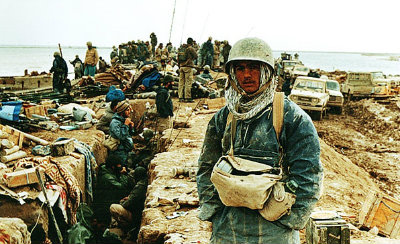Summary | Excerpt | Reading Guide | Reviews | Beyond the Book | Read-Alikes | Genres & Themes | Author Bio

This article relates to Moon Brow
The 1980-88 war between Iraq and Iran, which forms the backdrop to Moon Brow, is widely considered one of the bloodiest conflicts of the twentieth century. At least one million lives are estimated to have been lost, half of them civilians. The eight-year standoff is said to have cost its aggressors a combined one trillion dollars, an astonishing figure for what was a largely conventional war.
Territorial and tribal disputes have always marked the relationship between Iran and Iraq, but by the time war broke out in 1980, diplomatic relations had reached an alarmingly low point. Following the 1979 Iranian Revolution—which overthrew Tehran's despotic Shah and declared Iran an Islamic state, ruled by the Ayatollah Khomeini—Iraqi leader Saddam Hussein began to grow uneasy; his particular brand of secular authoritarianism, after all, matched the Shah's, and he feared the revolution would spread to his own country. He also wished to enlarge Iraq's oil reserves and to assert his country as the region's dominant military power.
Consequently, in September 1980, on the pretext of defending the Shaab al-Arab (a long-disputed waterway that runs between the two countries), Saddam declared war on Iran, ordering strikes on Iranian airfields and subsequently launching a full-scale ground invasion.
 At first, Saddam's army—led by the formidable Revolutionary Guard—made quick territorial gains, including most of the Shaab al-Arab and the oilfields to its east. The newborn Islamic Republic was still relatively weak and chaotic, and the Iraqi army took advantage of its neighbor's troubles to push ever deeper towards Tehran. By 1981, however, the Iranian army had strengthened into a powerful military machine, and with both armies roughly matched in terms of size and firepower, the fighting devolved into a brutal war of attrition. With its lines of trenches stretching along the border, the battlefield began to resemble the Western Front during the First World War, a conflict with which it is often compared.
At first, Saddam's army—led by the formidable Revolutionary Guard—made quick territorial gains, including most of the Shaab al-Arab and the oilfields to its east. The newborn Islamic Republic was still relatively weak and chaotic, and the Iraqi army took advantage of its neighbor's troubles to push ever deeper towards Tehran. By 1981, however, the Iranian army had strengthened into a powerful military machine, and with both armies roughly matched in terms of size and firepower, the fighting devolved into a brutal war of attrition. With its lines of trenches stretching along the border, the battlefield began to resemble the Western Front during the First World War, a conflict with which it is often compared.
Over the next seven years, the prolonged stalemate that arose began to attract international attention. Almost every global power, including both the US and the Soviet Union, supported Baghdad, while Tehran stood largely alone. Within Iran, however, the war was seen as a cosmic battle for the ideological and religious validity of the Islamic Republic, a status quo which allowed the military leadership to justify all losses, no matter how atrocious.
In July 1987, after bitter peace negotiations, the United Nations passed a resolution calling for an immediate ceasefire. A year later, the war came to an end. Very little was gained, finally, by either side, and its legacy can be experienced in the songs and literature of both countries, and in the enormous graveyards that continue to line this most troubled of frontiers.
Picture of Iranian soldiers from Commander Navy
Filed under People, Eras & Events
![]() This article relates to Moon Brow.
It first ran in the May 2, 2018
issue of BookBrowse Recommends.
This article relates to Moon Brow.
It first ran in the May 2, 2018
issue of BookBrowse Recommends.
Your guide toexceptional books
BookBrowse seeks out and recommends the best in contemporary fiction and nonfiction—books that not only engage and entertain but also deepen our understanding of ourselves and the world around us.